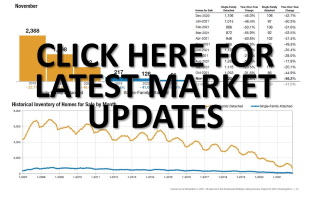RE/MAX National Housing Report for May 2020
DENVER, June 17, 2020 /PRNewswire/ -- May, often the second-strongest month for home sales, saw what many believe may be the biggest housing impact from the pandemic as closings dropped 33.7% compared to last year.
All 53 markets in the report sustained double-digit year-over-year sales declines:
- Sales in four markets shrunk by more than half, led by Detroit's drop of 64.8%
- Eighteen markets saw sales drop by one-fourth to one-third
- Des Moines's sales decline of 14.3% was the smallest
While the Median Sales Price of $272,000 was up 4.7%, it was softer than the 5.4% average May-to-May price increase in the previous five years.
Inventory dropped 25% year-over-year to one of the lowest levels for May in the report's 12-year history. Only Indianapolis (12.7%), Wichita (4.3%) and Chicago (1%) posted increases in the number of homes for sale compared to May 2019.
With May being the second full month under stay-at-home mandates in many states, home sales were the lowest for the month since 2012, and on a par with wintertime home-sales activity. Compare that to 2017, 2018 and 2019, when May posted the highest or second-highest home sales of the year. June typically sees the year's most home sales and highest Median Sales Price.
"Not surprisingly, May sales were historically muted alongside increasingly pinched inventory as the full brunt of the pandemic likely manifested itself during the month," said Adam Contos, CEO of RE/MAX Holdings, Inc. "However, as the local outlook across the country increasingly pivoted to how soon stay-at-home restrictions might end, multiple leading indicators in the U.S. housing market have turned positive, some even on a year-over-year basis."
Contos continued, "We believe the spring selling season was largely deferred for several weeks. And, with home being the center of people's lives this year, we could see the effect of pent-up demand play out in a significant way. Absent another major coronavirus wave, inventory levels and the unemployment rate may well be the governors on how strong the housing market performs this year."
The average Days on Market of 46 and the 2.5 Months Supply of Inventory both tied report records for May, set in 2018.
Closed Transactions
Of the 53 metro areas surveyed in May 2020, the overall average number of home sales is down 3.9% compared to April 2020, and down 33.7% compared to May 2019. All 53 metro areas saw a year-over-year decrease in closed transactions. The metro areas with the lowest year-over-year decreases were Des Moines, IA at -14.3%, Little Rock, AR at -15.5%, and Richmond, VA at -15.6%.
Median Sales Price – Median of 53 metro median prices
In May 2020, the median of all 53 metro Median Sales Prices was $272,000, down 1.0% from April 2020, and up 4.7% from May 2019. Five metro areas saw a year-over-year decrease in Median Sales Price, with the largest decreases in Detroit, MI at -2.9%, Burlington, VT at -1.3%, and Houston, TX at -0.7%. Three metro areas increased year-over-year by double-digit percentages, Manchester, NH at +11.9%, New York, NY at +10.8%, and Miami, FL at +10.0%.
Days on Market – Average of 53 metro areas
The average Days on Market for homes sold in May 2020 was 46, equal to the average in April 2020, and down two days from the average in May 2019. The metro areas with the lowest Days on Market were Seattle, WA at 22, Cincinnati, OH at 24, and Nashville, TN at 25. The highest Days on Market averages were in Miami, FL at 103, Des Moines, IA at 96, and Burlington, VT at 91. Days on Market is the number of days between when a home is first listed in an MLS and a sales contract is signed.
Months Supply of Inventory – Average of 53 metro areas
The number of homes for sale in May 2020 was down 4.0% from April 2020 and down 25.0% from May 2019. Based on the rate of home sales in May 2020, the Months Supply of Inventory decreased to 2.5 compared to 3.7 in April 2020, and decreased compared to 3.0 in May 2019. A six months supply indicates a market balanced equally between buyers and sellers. In May 2020, of the 53 metro areas surveyed, four metro areas reported a months supply at or over six, which is typically considered a buyer's market. Those four markets were Indianapolis, IN at 6.4, Miami, FL at 6.9, New Orleans, LA at 6.1, and New York, NY at 9.6. The markets with the lowest Months Supply of Inventory were Albuquerque, NM at 0.9, Omaha, NE at 1.0, and a three-way tie between Charlotte, NC, Manchester, NH, and Denver, CO at 1.1.
Feel free to contact me and I can help break down exactly what these numbers mean for our local market and for your neighborhood. And lastly, If you or anyone you know is thinking of buying or selling a home - please call or email me. I'm here to help!
Peter Veres
Associate Broker,CRS,ABR,CLHMS,SRES
Elite Asset Management Team - RE/MAX Elite
Cell: 505-362-2005










